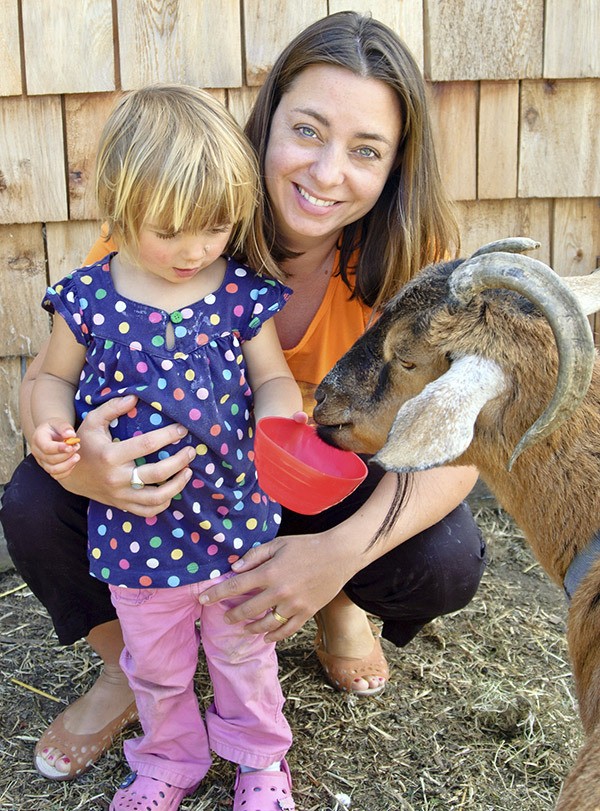By JENN REIDEL
The place where Betsey Archambault finds herself now — holding her daughter Emerson in her lap and a new puppy at her feet in her farmhouse overlooking Colvos passage — seems as they say “a far cry” from her life overseas. She was formerly a Child Fund International program manager working within five refugee camps on the Chad-Sudan border. There she helped communities create safe and healthy spaces for children and provided education for women’s and men’s groups on reproductive health, HIV and human rights.
Archambault and her husband and two daughters moved to Vashon a year and a half ago from Shanghai, China, where they lived in an apartment complex of 100,000 people who barely look at each other when passing by. Not so here, where more often than not curious islanders invite her to chat and listen to her story. If only it was that easy for Vashon to welcome the conversation about domestic violence. In her job as executive director of The DoVE Project, one of Archambault goals is to find a way to get more people to talk about this very real issue in our community. Last year DoVE’s crisis line had a 275 calls.
Jenn Reidel: As a new resident of the island how do you feel about your new community?
Betsey Archambault: Vashon is home, and in so many ways I have found my people. Everyone I meet is so invigorating for me personally and professionally because everyone has this passion about the community — what the community needs and what the community can be. That is very inspiring. Everything is so tied together.
I read that the reaction of a community is directly related to how a survivor recovers from domestic violence. How would this work here on our island?
It is all about community, and I think in some places that is true. For Vashon, the fact that it is a small community is one of the big barriers we have, to be perfectly honest. With small communities there are completely different problems. If you want to get away, you have to uproot your kids from the school system and support network. Also, if you are employed on the island, you lose your economic opportunity. So those are huge barriers which keep women or men in their situations. You don’t know what the next chapter is going to look like because you are leaving everything you know as your community. No matter how much you are in the center or on the fringes, you are still part of the community.
Do you agree that the subject of domestic violence is not welcome in most cases, and how would you change that?
I agree. The subject is not welcome. We have to reframe it. It is going to take some work, and it is going to take a long time because there is still a heavy taboo with talking about domestic violence. No one wants to believe it. I want to have T-shirts made that say “Give a Damn. Start the Conversation.” People like to be challenged in that way — I want to give a damn! What do you want me to give a damn about? And then the conversation starts.
With so much silence and secrecy involved, how do you help survivors get relief from the isolation?
Even though survivors are not speaking on Vashon due to the subject being fairly taboo, they are speaking to each other. We are building a network of trust because women and men are welcomed into our network. We have peer support groups led by a survivor. This week I received two calls from women who want to relocate to Vashon to get away with their families. I have directed them to our advocates. We were the first point of contact for them to be welcomed to the island. It is a different kind of welcome because these women are contacting us because they need continued support.
What is the best way to encourage survivors to welcome help? Any vision around that?
Community outreach. I want to invigorate the community and turn around the whole shame thing. If you look at it, what are the building blocks of a community? It is the families, right? Is there any shame involved in being in a partnership that then creates one of these building blocks of community? No, there is never any shame in that. What there should be the shame in is the person who tries to take away the stability of your own building block within the community. And when you start breaking down those building blocks, then the community is not as strong. It is absolutely a community issue. So I really want to start the conversation about domestic violence. Start it and continue it everywhere.
— Jenn Reidel is a freelance web designer, fine art photographer and writer who lives on Vashon. See jennreidel.com for other Welcome Vashon interviews.


